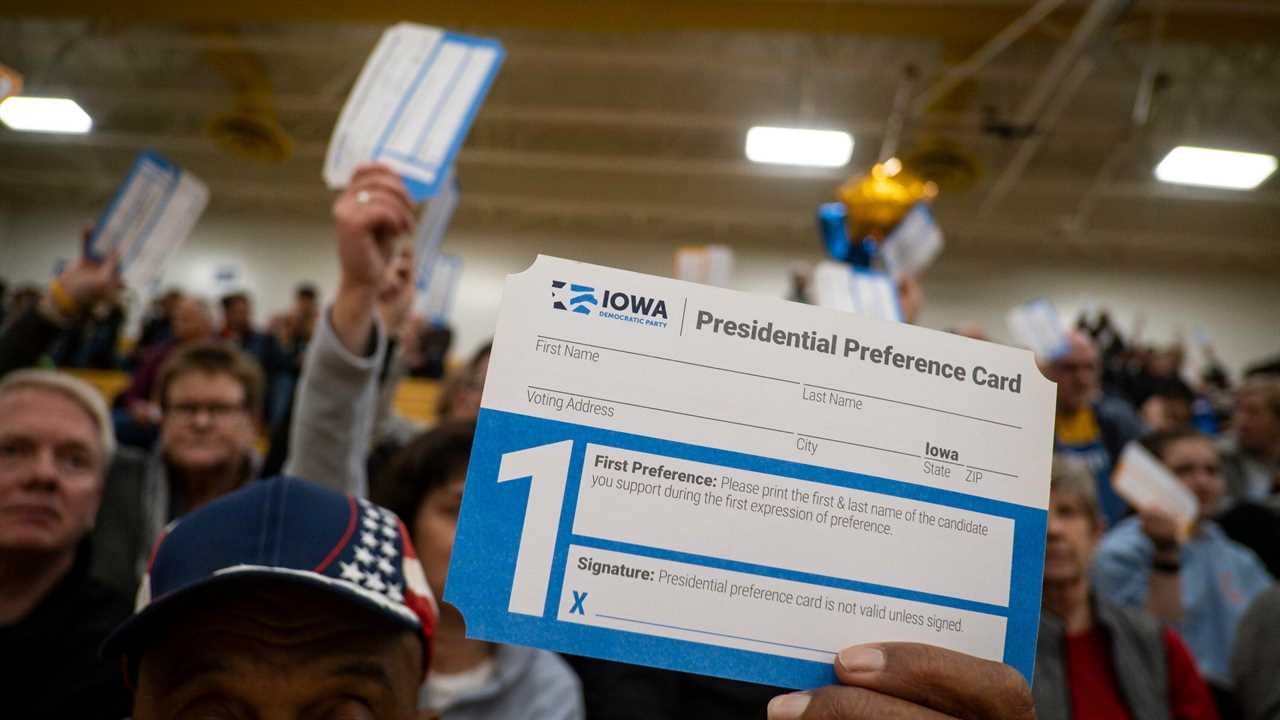
With Iowa’s closely watched presidential caucuses more endangered than ever after a disastrous showing in February that delayed results for days, the Iowa Democratic Party on Saturday sought to shift blame for the meltdown onto the Democratic National Committee.
More than 10 months after the fiasco marred Iowa’s first-in-the-nation nominating contest, the state party circulated a blistering internal report asserting that the national party had meddled in and delayed the development of an app for reporting results, implemented coding errors in its back-end result reporting system and required new data that further complicated the process.
The renewed sniping between Iowa Democrats and the national party comes at a critical time for the future of Iowa’s standing at the beginning of the presidential nominating calendar. The caucuses are a cherished tradition for Iowans, but an increasing number of national Democrats say they are outdated and undemocratic.
The heart of the 26-page Iowa report blames the D.N.C. for the delay in results on caucus night. It states that the national party, weeks before the Feb. 3 caucuses, demanded a new tool to give it real-time results. This new tool, the report states, included coding errors that delivered inaccurate results, leading to a days-long delay before former Mayor Pete Buttigieg of South Bend, Ind., and Senator Bernie Sanders of Vermont finished in a virtual tie for first place.
“When the D.N.C.’s database conversion tool failed to work correctly, it caused the D.N.C. to wrongly stop the I.D.P. from reporting its results, and the I.D.P.’s entire planned reporting process was thrown into disarray,” the report says. “If the D.N.C. had not interjected itself into the results reporting process based on its erroneous data conversion, caucus night could conceivably have proceeded according to the I.D.P.’s initial plan.”
Iowa’s first-in-the-nation status was in jeopardy even before the 2020 disaster.
Black and Hispanic Democrats argued that a state whose population is 90 percent white did not properly represent an increasingly diverse party. The caucuses themselves, which require people to attend in person, often for hours, and navigate labyrinthine rules, are less democratic than primaries, critics say. And the party’s internal record-keeping from caucus sites has been proved shoddy for a second presidential election in a row.
“The caucus system itself is an anti-democratic relic that we must do away with,” Julián Castro, the former U.S. housing secretary who as a 2020 presidential candidate was most vocal in attacking Iowa’s early-state status, said Saturday. “But it also must be a priority for the next D.N.C. chair to reorder our primaries so that they reflect our party’s diversity and values. Iowa and New Hampshire are wonderful places, but they should no longer go first.”
Iowa Democrats no longer have an ally leading their party in Washington. While Barack Obama owed his presidency to a surprise victory in the 2008 Iowa caucuses, President-elect Joseph R. Biden Jr. never built the robust Iowa organization of his top 2020 caucus rivals and finished a distant fourth once the results were finally released.
Mr. Biden, as president, will select the next D.N.C. leader. He has yet to reveal his selection, but the party began a review over the summer of its presidential nominating procedures that it expects will “make improvements to the 2024 nominating process.”
The D.N.C. declined to participate in the Iowa Democratic Party’s report. David Bergstein, a committee spokesman, said the D.N.C.’s involvement in the caucus setup had been validated by a litany of errors in the result reporting process.
“Underlying technical problems were caused by errors from the I.D.P.’s vendor,” he said, referring to a technology firm that built the smartphone caucus result reporting app.
The New York Times found that more than 100 Iowa caucus precincts had reported results that were internally inconsistent or missing data.
Iowa has long held its place at the beginning of the nominating calendar by working in a bloc with its fellow early states New Hampshire, South Carolina and Nevada, but for months there have been signs that those alliances have frayed.
Harry Reid, the former Senate majority leader who remains the functional head of the Nevada Democrats, in February called for all Democratic presidential caucuses to end. Jaime Harrison, the former South Carolina Democratic Party chairman who is a leading contender to lead the national party, declined on Saturday to say whether Iowa should retain its first-in-the-nation status.
There is no indication that Republicans will replace Iowa at the front of their 2024 presidential nominating calendar.
Of 10 key “takeaways” in a fact sheet distributed to Iowa Democratic Party members, six blame the D.N.C. for caucus-night problems.
The report, prepared by Bonnie Campbell, a former Iowa attorney general, and Nick Klinefeldt, a former top federal prosecutor in Iowa, also places blame on the Iowa Democratic Party for failing to anticipate problems in its caucus-night “boiler room,” citing a lack of training and too few telephone lines to receive results. Just 439 of 1,765 precincts successfully submitted results through the party’s smartphone app, and phone lines were jammed as precinct leaders tried calling instead.
Troy Price, who oversaw the bungled caucuses as chairman of the Iowa Democratic Party, resigned a week later.
The New York Times reported in February that the Iowa official in charge of the boiler room did not know how to use the Google spreadsheet application that Iowa Democrats used to enter data once the result reporting app failed.
The report also criticized news reporters for calling county officials and the party’s caucus-night headquarters in search of information when no results were being made public.
“The media indirectly interfered with the results reporting process by reaching out to county chairs directly for information and calling the boiler room hotline, tying up the already busy phone bank,” the report states.






